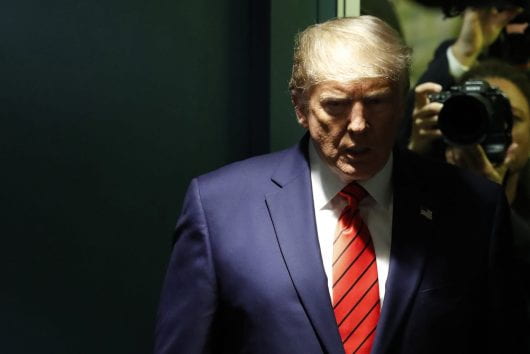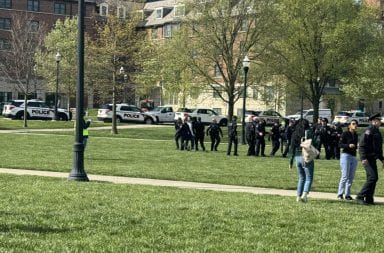
U.S. President Donald Trump arrives to address the General Debate of the 74th session of the UN General Assembly at the UN headquarters in New York, on Sept. 24. Credit: Courtesy of TNS
This generation of Buckeyes could experience its first presidential impeachment, and Ohio State professors are weighing in.
Peter Shane, the Davis Chair in Law at the Moritz College of Law, and Paul Beck, professor emeritus of political science, provided insight on the U.S House of Representatives officially beginning impeachment inquiries into President Donald Trump.
In a press conference Tuesday, Speaker Nancy Pelosi announced that the House of Representatives would formally begin impeachment inquiries into Trump. The move comes in light of a formal whistleblower complaint — a pathway for government employees to report improper actions to the intelligence community — that the Trump administration forbade the intelligence community inspector general from turning over the complaint to Congress, Pelosi said.
According to unclassified and nonverbatim documentation of a July 25 phone call between Trump and Ukrainian President Volodymyr Zelenskiy, Trump asked Zelenskiy to work with Attorney General William Barr to look into former vice president and current Democratic presidential candidate Joe Biden regarding Biden and his son, Hunter Biden, who sat on the board of a Ukrainian natural gas company. Shane said this could be considered improper use of the attorney general and foreign government.
The House will engage in official impeachment proceedings by directing six House committees to proceed with investigations under the impeachment umbrella, Pelosi said.
Impeachment — the constitutional process of accusing an elected official of a crime in an attempt to remove the official from office — is a constitutionally granted power used in instances of bribery, treason and “high crimes and misdemeanors.”
“It just refers to those abuses of the public trust that are so grave as to warrant removal from office, so it’s not as if there’s a specific list of offenses,” Shane said.
Bribery and treason are the only specific actions named in the Constitution, and Shane said it’s for the House to determine what qualifies as an impeachable offense.
Shane said that under the Constitution, the House committees now must “constitutionally ascertain a set of facts” and make judgments based on the facts gathered.
There are four main areas Shane said could justify the impeachment proceedings in terms of Trump’s alleged actions: financial corruption, obstruction of justice, abuse of power and stonewalling Congress — with the latter being where the blocked whistleblower complaint would fall.
“The president’s refusal to provide information — his claiming authority to tell private citizens whether they can or cannot provide information pursuant to congressional subpoenas — without formally claiming executive privilege, has tried to cast a net of executive branch secrecy broader than anything that any president has tried before,” Shane said.
Shane said the House could refer to historical patterns, including precedents such as former President Richard Nixon’s impeachment. In the Second Article of Nixon’s impeachment, Nixon was charged with misuse of government agencies to gain information on his political opponents.
In terms of how the impeachment proceedings may impact party politics, Beck said the combination of the whistleblower complaint, Ukraine phone call and stonewalling between the White House and the House Intelligence Committee quelled some previous impeachment uncertainty.
“The Ukraine controversy, the whistleblower message, these kinds of things have triggered stronger sentiment among Democrats that they want to proceed with impeachment; whereas before there was a lot of uncertainty about whether they wanted to,” Beck said.
Although Beck said not all House members were initially on board with impeachment, more representatives are changing their mind as the hours go by. The House needs 218 votes in favor of impeachment, and according to a count by Politico at the time of publication, a majority of members were in favor, including all four of Ohio’s Democratic representatives.
Beck said that with official impeachment proceedings beginning, Republicans have been more careful in voicing their support for the president. In fact, the Republican-majority Senate unanimously passed a resolution calling for Trump to turn over the whistleblower complaint.
Although impeachment proceedings look bad for Trump, Beck said the president could use this to forge a “political contest” by placing doubts in Democrats’ minds about Biden, who Trump may view as his leading opponent.
However, the impeachment inquiries are not guaranteed to hurt Trump’s 2020 campaign, Beck said. For example, following former President Bill Clinton’s impeachment, the Democrats benefited in the 1998 midterms.
At this point, both Beck and Shane agree that it is too soon to tell how the impeachment inquiries will play out.
“I think they have to seriously ask themselves, ‘Are there high crimes and misdemeanors?’” Shane said. “And the political chips just have to fall where they fall.”


